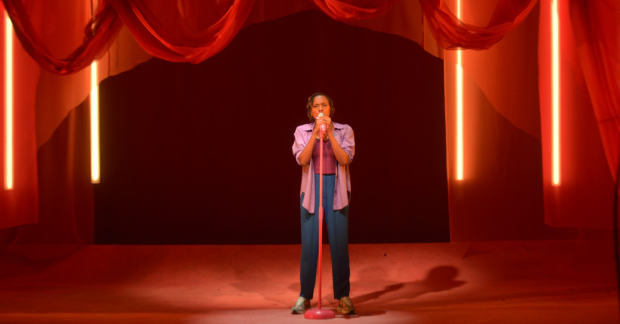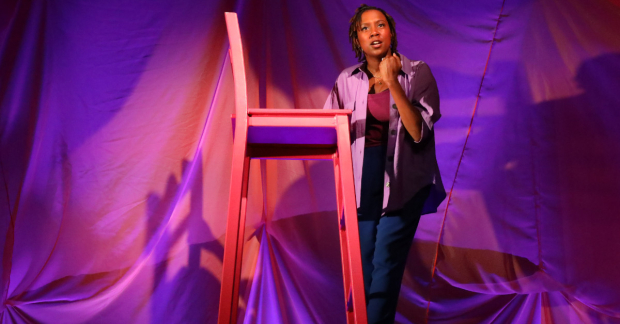Review: A Poet and Performer Tries to Bring Her Life Into Focus in Heart
Jade Anouka’s solo play is having its world premiere in an Audible production at the Minetta Lane Theatre.

(© Trévon James)
Coming out is not as hard as it used to be — at least we like to think that's the case. But is it true for everyone? Despite the progress we may have made in recognizing the inalienable rights of LGBTQ lives (putting aside recent rumblings of future setbacks), the ease with which you can live your life openly depends on many things, including where you are, where you come from, and how those around you react to difference.
In the new solo play Heart, now running at the Minetta Lane Theatre in an Audible production (in association with Kate Pakenham Productions), London-based actor and playwright Jade Anouka reminds those of us who live in culturally progressive metropolitan bubbles that society and the world at large have a long ways to go in the acceptance of "others." The 70-minute show incorporates Anouka's poetic storytelling talents in what is presumably an autobiographical account of her journey into self-awareness, leaving behind a life that felt prescribed by the world in exchange for one that felt authentic and her own.
The difficulty of a story like this is how to distinguish it from the myriad similar narratives (theatrical and otherwise) that we've seen or read over the decades. Anouka's keen poetry is one way that Heart stands apart; her words flow with the feel of a long free-verse poem occasionally punctuated with rhyme and a slam-poetry vibe. This makes Anouka's work a pleasure to listen to (undoubtedly one of the reasons Audible chose to get behind it). But despite a strong performance and a creative team determined to bring those words to life onstage, Heart does not translate into captivating theater.

(© Trévon James)
Anouka, decked in blues and purples (costume design by Emily Rebholz), begins her play by telling us that though she is a Black woman, "This is not a black story / Or a woman story / This is perhaps a story / For all the misfits, all those who have ever felt 'other.'" It is a welcome attempt at inclusiveness that invites the entire audience in, even as we reserve our doubts about the possibility of excluding characteristics from ourselves that inevitably shape our identities and our stories. She goes on to talk about her marriage, at 24, to a man whose mental illness contributed to their decision to divorce, her subsequent joyous embrace of promiscuity, her temporary retreat into the arms of another man, and then her discovery that her most fulfilling partner was a woman. Coming as she does from a religious household, the epiphany provokes an uncomfortable conversation with her mother.
As every LGBTQ person who has tried to discuss being gay with a religious person hurling Bible verses every which way knows, such conversations go in circles at lightning speed. This part of Anouka's narrative saps the energy from the stage as she relates her counterarguments, using the ineffective stratagem of logic, to her mother. In such moments we become conscious of Anouka's performance rather than the story, and it seems more obvious how, despite her solid acting talent, this narrative isn't the best fit for the stage.
Under the heavy-handed direction of Ola Ince, the rest of the production seems determined to convince us that it is. Arnulfo Maldonado's billowy set design of red and pink curtains, which might suggest the chambers of a heart, has a grandiloquence that simply looks like it's trying too hard to make Heart into theater. Jen Schriever's lighting also calls attention to itself, accentuating every little shift and mood with dramatic lighting. Fitz Patton's sound design, along with his and Renell Shaw's original music, jibes better with Anouka's poetry — and again makes a good case for an Audible production.
But it is Anouka's words that matter here. They are powerful, beautiful, and, in her moving conclusion, full of hope. A production with fewer bells and whistles might have allowed the audience and the misfits among us to contemplate them more thoughtfully. Anouka's play certainly does have heart, but it is better suited for the ear than the eye.









